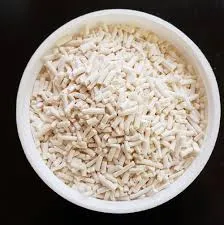
vitamin c as preservative
The Role of Vitamin C as a Natural Preservative
In recent years, the quest for natural food preservation methods has gained significant momentum, driven by consumer demand for clean labels and reduced chemical additives. Among various natural preservatives, Vitamin C, or ascorbic acid, has emerged as a promising candidate, not only owing to its antioxidant properties but also due to its vital role in human health. This article explores Vitamin C's functions as a preservative in food products and its implications for overall food safety.
Understanding Vitamin C
Vitamin C is a water-soluble vitamin that plays a crucial role in various bodily functions, including collagen synthesis, iron absorption, and immune system support. It is a potent antioxidant, protecting cells from oxidative stress caused by free radicals. Found abundantly in citrus fruits, strawberries, bell peppers, and green leafy vegetables, Vitamin C has been recognized not only for its health benefits but also for its potential in food preservation.
Mechanism of Action
The preservative properties of Vitamin C largely stem from its ability to act as an antioxidant. In many food products, oxidation leads to spoilage, flavor changes, loss of nutrients, and the growth of harmful microorganisms. Vitamin C can neutralize free radicals, thereby inhibiting the oxidation process. This characteristic is particularly significant in fatty foods, where lipid oxidation can drastically affect quality and safety.
Furthermore, Vitamin C can also lower the pH of food products, creating an environment that is less conducive to the growth of pathogenic bacteria and molds. Lowering pH effectively enhances the preservation effect, making it a multifunctional agent in food preservation.
Applications in Food Preservation
vitamin c as preservative

Vitamin C is increasingly being used as a natural preservative in various food products. For instance, it is often added to dried fruits to prevent browning and maintain vibrant colors. In processed meat products, Vitamin C can prolong shelf life by reducing discoloration and off-flavors associated with rancidity.
Moreover, the beverage industry has also witnessed the incorporation of Vitamin C as a preservative. Fruit juices enriched with Vitamin C not only boast enhanced nutritional value but also retain their freshness for longer periods. Additionally, Vitamin C has found its place in the preservation of baked goods, where it helps maintain texture and extend shelf life.
Advantages Over Synthetic Preservatives
One of the most compelling reasons for using Vitamin C as a preservative is its safety and minimal side effects compared to synthetic preservatives. Consumers are increasingly wary of chemical additives, often associating them with adverse health effects. Vitamin C, being a naturally occurring compound, aligns well with the clean label trend, providing a safe and effective alternative.
Furthermore, as more research highlights the health benefits of antioxidants, using Vitamin C in food products can also enhance the perceived value of those products. This added nutritional benefit can be a powerful marketing tool for food manufacturers aiming to appeal to health-conscious consumers.
Conclusion
As the food industry continues to evolve towards more natural preservation methods, Vitamin C stands out as an effective, safe, and multifunctional agent. Its dual role as a nutrient and preservative not only aids in extending the shelf life of various food products but also contributes positively to human health. By embracing Vitamin C as a natural preservative, food manufacturers can meet consumer demands while ensuring safety and quality in their products. It is clear that, as we look to the future of food preservation, Vitamin C will play a pivotal role in enhancing both the safety and nutritional profile of our food supplies.
-
Pure Sodium Dichloroisocyanurate Dihydrate | Powerful DisinfectantNewsAug.29,2025
-
Industrial Chemicals: Quality & Purity for Every IndustryNewsAug.28,2025
-
Nitrile Rubber Honoring Strict Production StandardsNewsAug.22,2025
-
Aspartame Ingredients Honoring Food Safety ValuesNewsAug.22,2025
-
Fertilizer for Balanced Plant NutritionNewsAug.22,2025
-
Cyanide Gold Processing with High Purity AdditivesNewsAug.22,2025
-
Formic Acid in Textile Dyeing ApplicationsNewsAug.22,2025
Hebei Tenger Chemical Technology Co., Ltd. focuses on the chemical industry and is committed to the export service of chemical raw materials.
-

view more DiethanolisopropanolamineIn the ever-growing field of chemical solutions, diethanolisopropanolamine (DEIPA) stands out as a versatile and important compound. Due to its unique chemical structure and properties, DEIPA is of interest to various industries including construction, personal care, and agriculture. -

view more TriisopropanolamineTriisopropanolamine (TIPA) alkanol amine substance, is a kind of alcohol amine compound with amino and alcohol hydroxyl, and because of its molecules contains both amino and hydroxyl. -

view more Tetramethyl Thiuram DisulfideTetramethyl thiuram disulfide, also known as TMTD, is a white to light-yellow powder with a distinct sulfur-like odor. It is soluble in organic solvents such as benzene, acetone, and ethyl acetate, making it highly versatile for use in different formulations. TMTD is known for its excellent vulcanization acceleration properties, which makes it a key ingredient in the production of rubber products. Additionally, it acts as an effective fungicide and bactericide, making it valuable in agricultural applications. Its high purity and stability ensure consistent performance, making it a preferred choice for manufacturers across various industries.





